北师大版八年级英语上册全册教案
- 格式:doc
- 大小:15.73 MB
- 文档页数:82
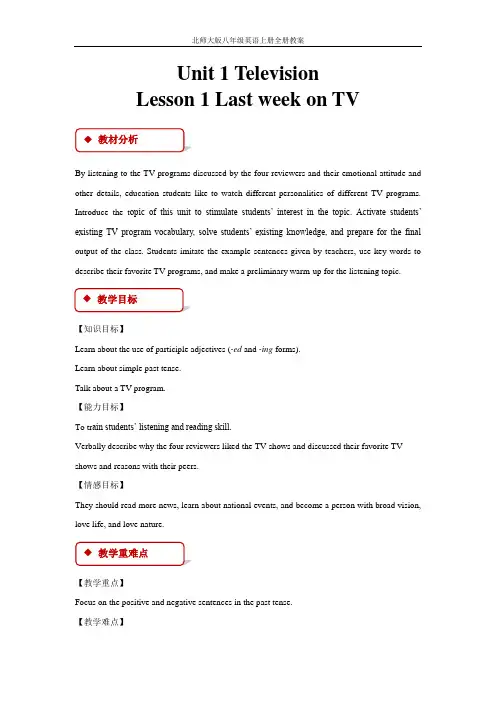
Unit 1 TelevisionLesson 1 Last week on TVBy listening to the TV programs discussed by the four reviewers and their emotional attitude and other details, education students like to watch different personalities of different TV programs. Introduce the t opic of this unit to stimulate students’ interest in the topic. Activate students’ existing TV program vocabulary, solve students’ existing knowledge, and prepare for the final output of the class. Students imitate the example sentences given by teachers, use key words to describe their favorite TV programs, and make a preliminary warm-up for the listening topic.【知识目标】Learn about the use of participle adjectives (-ed and -ing forms).Learn about simple past tense.Talk about a TV program.【能力目标】To tr ain students’ listening and reading skill.Verbally describe why the four reviewers liked the TV shows and discussed their favorite TV shows and reasons with their peers.【情感目标】They should read more news, learn about national events, and become a person with broad vision, love life, and love nature.【教学重点】Focus on the positive and negative sentences in the past tense.【教学难点】Guide students to use the sentence patterns flexibly in activities and life, and cultivate students’ ability to read English.MultimediaStep 1. Warm upIs learning a language difficult?Look at the key words. Listen and read.Key words: Language learningcharacter, conversation, grammar, listening, passage, pronunciation, reading, speaking, vocabulary, writingChoose the correct words to complete the sentences on the right.1. She speaks English very well. Her __________________ is quite good.2. He is learning to write Chinese _________.3. Sometimes ____________________ rules are hard to remember.4. I just read an interesting _________ in an old book.5. We had a long ____________ about the interview on the Internet.Step 2.Discussion1. What do you think is difficult about learning a language?2. Have a discussion with your partner, using the key words.Step 3.Listening1. When did Tina come to Beijing?2. Did Tina like her teacher?What did Tina do in her Chinese class?Listen to the first part of the interview and answer the questions.1. When did Tina come to Beijing?2. Did Tina like her teacher?3. What did Tina do in her Chinese class?Think about the information in the chart.Listen to the second part of the interview and complete the notes about James. James—learning ChineseListen to the whole interview and write Tina, James or Tina &James in each blank.1. ______learned some Chinese from games and TV.2. ______ began learning Chinese at university.3. _____________ think(s) Chinese writing is difficult.4. ______ didn’t speak any Chinese before 2008.Step 4.Grammar一般过去时态:陈述句变一般疑问句1. 当句中含有系动词was/were或情态动词could/would时,把系动词或情态动词提到句首。
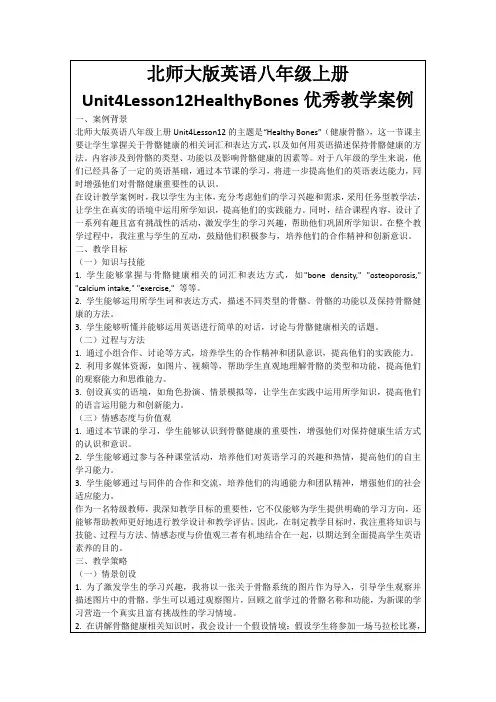
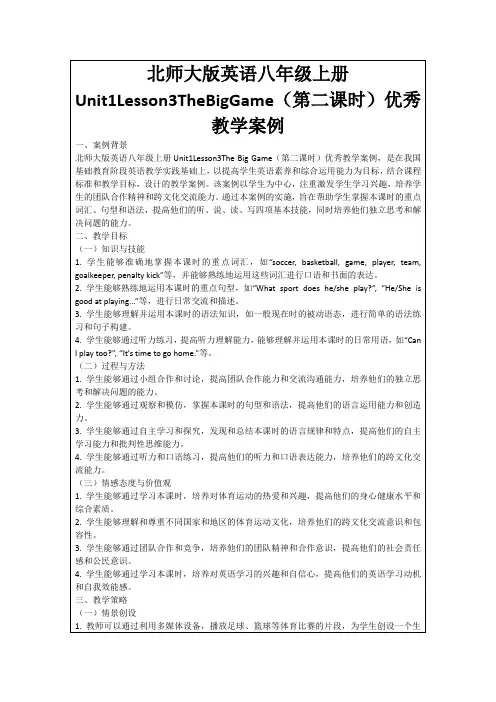
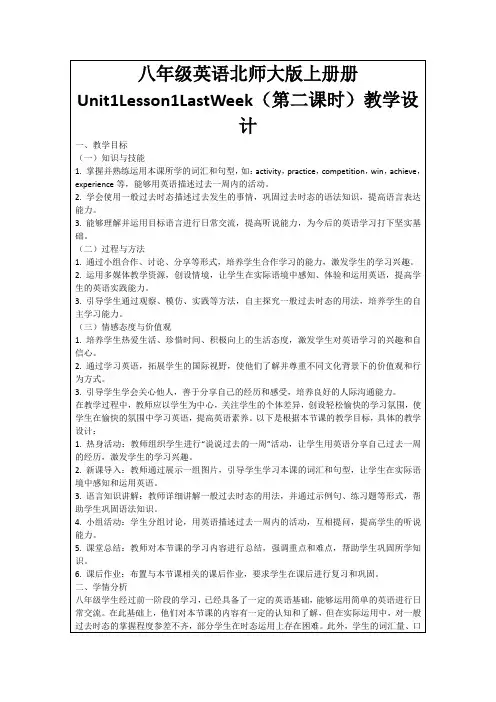
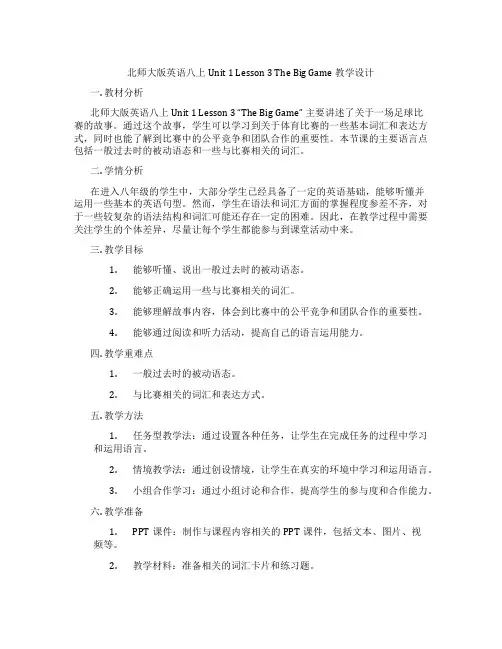
北师大版英语八上Unit 1 Lesson 3 The Big Game 教学设计一. 教材分析北师大版英语八上Unit 1 Lesson 3 “The Big Game” 主要讲述了关于一场足球比赛的故事。
通过这个故事,学生可以学习到关于体育比赛的一些基本词汇和表达方式,同时也能了解到比赛中的公平竞争和团队合作的重要性。
本节课的主要语言点包括一般过去时的被动语态和一些与比赛相关的词汇。
二. 学情分析在进入八年级的学生中,大部分学生已经具备了一定的英语基础,能够听懂并运用一些基本的英语句型。
然而,学生在语法和词汇方面的掌握程度参差不齐,对于一些较复杂的语法结构和词汇可能还存在一定的困难。
因此,在教学过程中需要关注学生的个体差异,尽量让每个学生都能参与到课堂活动中来。
三. 教学目标1.能够听懂、说出一般过去时的被动语态。
2.能够正确运用一些与比赛相关的词汇。
3.能够理解故事内容,体会到比赛中的公平竞争和团队合作的重要性。
4.能够通过阅读和听力活动,提高自己的语言运用能力。
四. 教学重难点1.一般过去时的被动语态。
2.与比赛相关的词汇和表达方式。
五. 教学方法1.任务型教学法:通过设置各种任务,让学生在完成任务的过程中学习和运用语言。
2.情境教学法:通过创设情境,让学生在真实的环境中学习和运用语言。
3.小组合作学习:通过小组讨论和合作,提高学生的参与度和合作能力。
六. 教学准备1.PPT课件:制作与课程内容相关的PPT课件,包括文本、图片、视频等。
2.教学材料:准备相关的词汇卡片和练习题。
3.教学设备:准备电脑、投影仪等教学设备。
七. 教学过程1.导入(5分钟)通过播放一段足球比赛的视频,引起学生的兴趣,然后提问学生他们对足球的了解和喜好。
2.呈现(10分钟)向学生介绍故事的主题和主要人物,然后通过PPT课件呈现故事内容,同时讲解一般过去时的被动语态和与比赛相关的词汇。
3.操练(15分钟)将学生分成小组,每组发一套词汇卡片,让学生通过小组合作的方式,用英语进行卡片游戏,巩固所学的词汇和语法知识。
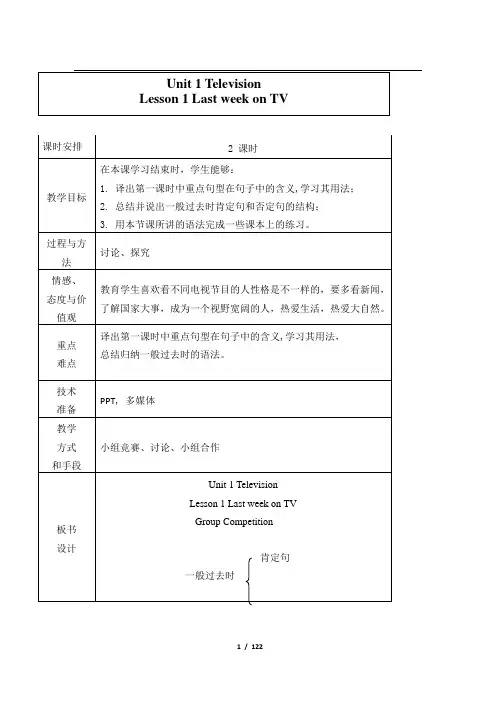
Unit 1 Television Lesson 2 An Interview on TVUnit 1 TelevisionLesson 4 Communication Workshop【教材分析】本单元的话题为电视节目、语言学习经历、体育与赛事。
在本单元第1—3课学生通过阅读和听力活动进行了相关内容的语言学习和初步应用。
前三个输入课的学习,学生通过阅读,获取了上周电视节目和体育与赛事的相关语言信息;通过听力,学习了对Tina和James 的采访,从而了解他们语言学习经历的信息。
在本课,学生要综合使用本单元所获取的有关的词汇和语言信息,以书面形式介绍并评价自己最喜爱电视节目。
此话题贴近学生生活,是学生较为熟悉的话题。
从哪几个方面表达和如何正确运用一般过去时态表达是学生存在困难的地方。
本课的教学设计分为两课时,第一课时学生通过阅读获取与写作相关的语言信息。
引导学生关注文章结构和语言表达,通过小组合作的方式,讨论完善写作提纲。
在第二课时,引导学生进行写作自评和互评,学会欣赏他人作品。
学生根据评价,自己修改文章,完成写作作品。
最后,学生和同伴在写作的基础上,展开关于对喜爱的电视节目的讨论和交流。
【教学内容】话题:电视节目学习内容:阅读Jack的博客获取有关谈论自己喜爱的节目的信息;阅读:通过使用不同的阅读策略,获取文本主要信息,关注文章结构和目标语言;写作:模仿范文结构,列出提纲,进行写作、评价和修改;口语表达:介绍自己最喜爱的电视节目并评价。
【教学目标】在本课学习结束时,学生能够:1. 通过阅读范文,获取有关Jack的最喜爱的电视节目信息;2. 在范文中找出自己写作任务中所需要的内容语言,丰富自己的相关话题的表达语言;3. 分析和归纳范文结构;4. 列出写作提纲。
【教学过程】。
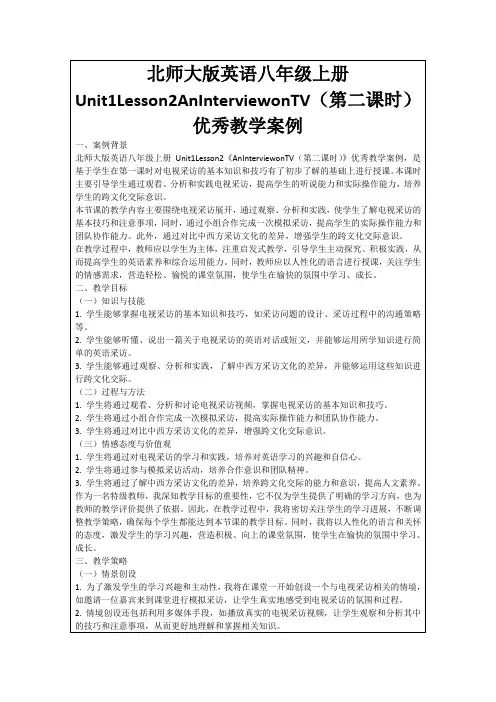
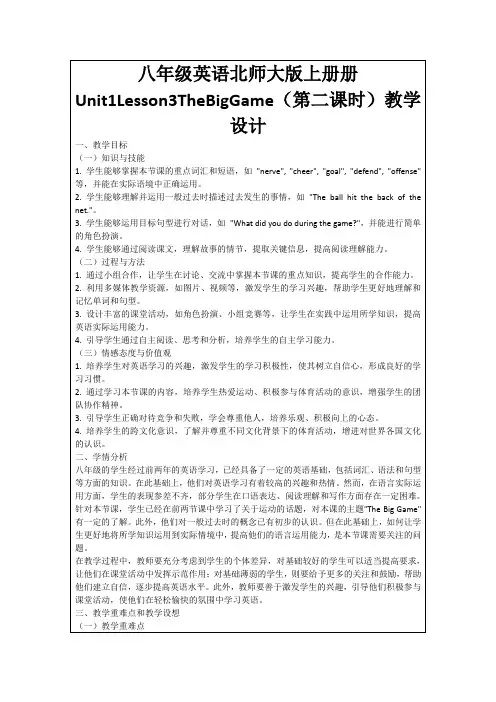
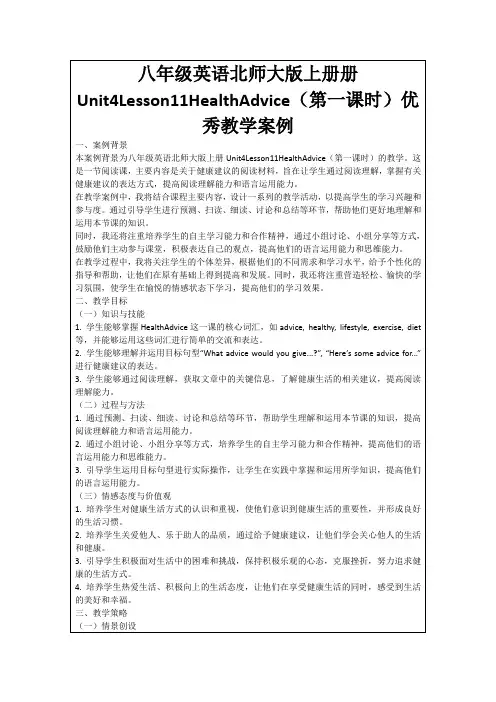
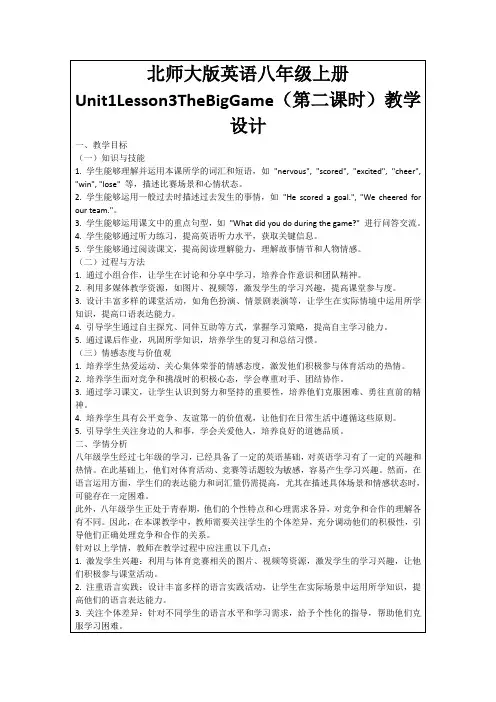
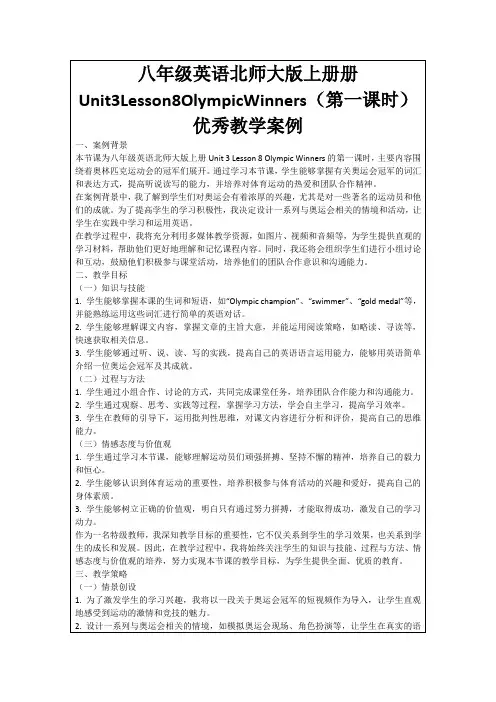
新版北师大版八年级上册英语全册教案教学设计版一、导言本教案教学设计版适用于新版北师大版八年级上册英语全册教学。
教案旨在提供全面、系统的教学指导,帮助教师合理组织教学内容,提高教学效果。
二、教学目标1. 语言技能目标:培养学生听、说、读、写的能力,提升他们的英语综合运用能力。
2. 语言知识目标:通过教学,让学生掌握八年级上册所涉及的英语单词、词组、句型和语法知识。
3. 研究策略目标:引导学生培养良好的研究惯和研究策略,提高他们的自主研究能力和合作研究能力。
三、教学内容与安排1. 单元一:Unit 1 - School Life- 课文:阅读和理解有关学校生活的文章,研究并运用相关的词汇和表达方式。
- 听说任务:进行学校生活相关主题的口语训练,培养学生的听、说能力。
2. 单元二:Unit 2 - My Hobbies- 课文:研究描述个人爱好的词汇和句型,培养学生在话题上进行阐述的能力。
- 阅读理解:通过阅读理解题目,提高学生阅读能力,发展他们的阅读技巧。
3. 单元三:Unit 3 - Going Places- 课文:研究有关旅行的词汇和句子,让学生能够用英语描述自己的旅行经历。
- 写作任务:引导学生通过写作,表达自己对旅行的观点和感受。
4. 单元四:Unit 4 - At the Movies- 课文:研究关于电影的词汇和表达方式,提高学生的听力和口语技能。
- 听力训练:进行电影相关主题的听力训练,培养学生听取关键信息的能力。
5. 单元五:Unit 5 - Sports Events- 课文:研究有关体育赛事的词汇和句子,培养学生在口语和写作方面的综合能力。
- 小组讨论:组织学生进行体育赛事相关主题的小组讨论,培养他们的合作能力。
6. 单元六:Unit 6 - Technology- 课文:研究关于科技的词汇和句子,提高学生的听力和口语技能。
- 视听说任务:进行科技相关主题的视听说任务,培养学生运用英语进行表达的能力。
2023年北师大版八年级上册英语教案
I. 教学目标
1. 了解英语课程的整体目标和研究内容。
2. 培养学生的英语听、说、读、写等综合语言能力。
3. 培养学生的跨文化交际能力和研究策略。
4. 提高学生的自主研究和合作研究能力。
5. 培养学生的创新思维和问题解决能力。
II. 教学内容
本教案涵盖教材第一至第三单元的主要课文和语言点。
III. 教学步骤
课前准备
1. 复上节课内容。
2. 预本节课将涵盖的课文和语言点。
课堂教学
1. 导入新课,引发学生兴趣。
2. 呈现课文,帮助学生建立整体理解。
3. 分析课文语言点,解释重点词汇和语法结构。
4. 听力练,培养学生的听力技能和理解能力。
5. 口语练,培养学生的口语表达能力。
6. 阅读练,提高学生的阅读理解能力。
7. 写作练,提升学生的写作水平。
8. 小组合作活动,培养学生的合作研究能力。
9. 总结复,巩固所学内容。
课后作业
1. 完成课堂练和作业。
2. 预下节课内容。
IV. 教学评估
1. 课堂表现的评估,包括学生的参与度和表达能力。
2. 作业的评估,包括完成情况和准确性。
3. 各种练和测试的评估,包括听力、口语、阅读和写作等方面的能力。
4. 学生互评和自评,促进学生的自我反思和提高。
北师大版英语八年级上册全册最新精品教
案
该教案分为以下几个模块:
1. Unit 1:Where's your pen pal from?
本模块主要涵盖介绍笔友的国家,研究询问家庭成员和朋友的
情况及回答,并掌握一些关于英语国家文化的知识。
2. Unit 2:Where did you go on vacation?
本模块主要涵盖介绍假期去的地方,研究询问旅行线路、交通
工具、旅行时间、景点介绍和旅行经历,并掌握一些常用的短语和
交际技巧。
3. Unit 3:What were you doing when the rainstorm came?
本模块主要涵盖过去进行时态,研究描述一些过去正在发生的
事情,有关天气和自然灾害的知识,以及应对不同应急情况的表达。
4. Unit 4:Were there any animals in the park?
本模块主要涵盖there be句型,研究描述某个场所的存在事物,并掌握一些描述自然界和动物的单词和短语。
5. Unit 5:Why do you like pandas?
本模块主要涵盖动物及其性的知识,研究掌握一些描述动物的
形容词和描绘性语言。
同时,还要深入了解中国的国宝——大熊猫,并掌握一些与动物保护相关的词汇和短语。
6. Unit 6:When was it invented?
本模块主要涵盖发明和发现的知识,研究询问或描述某个发明
或发现的历史背景、过程和影响,并掌握一些与科技和发明相关的
词汇和短语。
该教案贯穿了听、说、读、写等多个方面,内容丰富、实用性强,符合八年级学生的学科特点,是一份优秀的教学参考。
Unit 1 Lesson 3 The Big Game 教案Teaching aims:1. 通过创设一些情境让学生积极谈论体育节目,在此过程提升学生的口语表达水平。
2. 让学生进展对话练习,将课文主题与生活严密联系,培养学生在生活中学习英语、运用英语的能力。
3. 通过学习让学生能够熟练运用感慨句的表达。
Key points:重点学习感慨句。
Difficult points:引导学生在活动中、生活中灵活运用句型,培养学生英语口语的能力。
Teaching preparations:PPT, cards, pictures.Teaching procedures:Step 1: Warm-up1. Greeting:T: Good morning, girls and boys. Did you watch the World Cup in the vacation?2. Lead-inT: What sports do you like to watch? Describe one of your favourite sports shows to the class.Step 2: Reading1. Read the dialogues. Match each dialogue with the correct picture.2. Read the dialogues again and write the correct names in each blank.1) hurt his foot.2) scores a goal.3) fouls when he tries to make a basket.4) hits the ball to the back of the court.Step 3: Function1. T: Let’s read the key expressions.Key expressions: ExclamationsWow! What a great kick!Are you kidding me?What a shame!Can you believe that?How exciting!2. Make sentences with the words and add the exclamations from key expressions.Example:A: She kicked the ball and made a goal.B: How exciting!1) She/ kick the ball/ make a goal2) I/ forget/ homework3) my dad/ lose/ car keys4) she/ fall/ hurt her arm5) our team/ with the gameStep 4: Speaking (pair work)T: Tell your partner five events that have happened recently, and respond to your partner’s events using exclamations.Example:A: My dad lost his car keys.B: Oh, that’s too bad!Step 5: Homework1. Memory all the new words and expressions.2. Describe one of your favourite sports shows.。
Unit 1 TelevisionLesson 1 Last week on TVBy listening to the TV programs discussed by the four reviewers and their emotional attitude and other details, education students like to watch different personalities of different TV programs. Introduce the topic of this unit to stimulate students’interest in the topic. Activate students’existing TV program vocabulary, solve students’existing knowledge, and prepare for the final output of the class. Students imitate the example sentences given by teachers, use key words to describe their favorite TV programs, and make a preliminary warm-up for the listening topic.【知识目标】Learn about the use of participle adjectives (-ed and -ing forms).Learn about simple past tense.Talk about a TV program.【能力目标】To train students’ listening and reading skill.Verbally describe why the four reviewers liked the TV shows and discussed their favorite TV shows and reasons with their peers.【情感目标】They should read more news, learn about national events, and become a person with broad vision, love life, and love nature.【教学重点】Focus on the positive and negative sentences in the past tense.【教学难点】Guide students to use the sentence patterns flexibly in activities and life, and cultivate students’ability to read English.MultimediaStep 1. Warm upIs learning a language difficult?Look at the key words. Listen and read.Key words: Language learningcharacter, conversation, grammar, listening, passage, pronunciation, reading, speaking, vocabulary, writingChoose the correct words to complete the sentences on the right.1. She speaks English very well. Her __________________ is quite good.2. He is learning to write Chinese _________.3. Sometimes ____________________ rules are hard to remember.4. I just read an interesting _________ in an old book.5. We had a long ____________ about the interview on the Internet.Step 2.Discussion1. What do you think is difficult about learning a language?2. Have a discussion with your partner, using the key words.Step 3.Listening1. When did Tina come to Beijing?2. Did Tina like her teacher?What did Tina do in her Chinese class?Listen to the first part of the interview and answer the questions.1. When did Tina come to Beijing?2. Did Tina like her teacher?3. What did Tina do in her Chinese class?Think about the information in the chart.Listen to the second part of the interview and complete the notes about James. James—learning ChineseListen to the whole interview and write Tina, James or Tina &James in each blank.1. ______learned some Chinese from games and TV.2. ______ began learning Chinese at university.3. _____________ think(s) Chinese writing is difficult.4. ______ didn’t speak any Chinese before 2008.Step 4.Grammar一般过去时态:陈述句变一般疑问句1. 当句中含有系动词was/were或情态动词could/would时,把系动词或情态动词提到句首。
I could ride a bike two years ago.Could you ride a bike two years ago?She was at Australia last year.Was she at Australia last year?一般过去时态:陈述句变一般疑问句2. 当句中含有实义动词时,在主语前加助动词did,动词还原成原形。
I got up at 5 o’clock yesterday.Did you get up at 5 o’clock yesterday?Look at the table and circle the correct words.Step 5.Pair workMake yes/no questions about James. Ask and answer in pairs. see a Chinese book in his cousin’s room?learn Chinese in high school?go to university?enjoy his Chinese class?A: Did he see a Chinese book in his cousin’s room?B: Yes, he did.A: Did he learn Chinese in high school?B: No, he didn’t.A: Did he go to university?B: Yes, he did.A: Did he enjoy his Chinese class?B: Yes, he did.Step 6.PracticeWrite wh- questions about the underlined words.Tina came to Beijing in 2008.________________________________________She sometimes played games in Chinese class._________________________________________James went to university in the US._________________________________________James didn’t use Chinese for many years._________________________________________ Brainstorm more wh- questions to ask Tina and James.Why did you want to learn Chinese?Who was your favorite teacher?Step 7.Group workWork in group of three, take turns role-playing Tina, James and the interviewer, asking and answering questions.Step 8.SpeakingWork in pairs. Talk about your own English learning experience.- When did you begin learning English?- What did you do in your English class?- What did you do after class?- What helped you learn English?A: In English class, I usually listen to the teacher carefully.B: Me too. Taking notes is also very important.Step 9.SpeakingA: In English class, I usually listen to the teacher carefully.B: Me too. Taking notes is also very important.Step 10.PronunciationChoose a circle. Guide your partner to it by reading the words aloud.Step 11.Play a game!For example:may, day, tree, try, meStep 12. Homework1. Recite the words and phrases.2. Talk about your English learning experience.略。